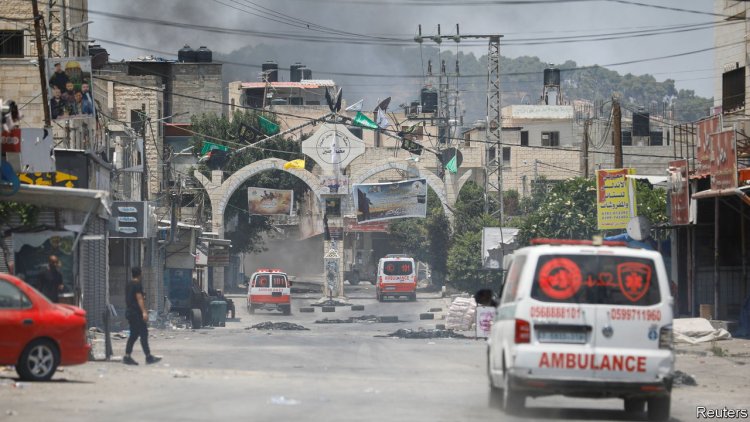Israel launches its biggest raid on the West Bank in over 20 years
image: ReutersAS THE SUN dipped on July 3rd, the fighting in a refugee camp in Jenin, a city in the West Bank, entered its second night. Ambulances ferried the injured through makeshift roadblocks, flaming tyres pumped a toxic black smoke into the air, and drones hummed faintly overhead. Israel’s army has carried out its largest raid on a Palestinian city in the West Bank since 2002, in an attempt to root out militants and destroy arsenals and explosive workshops there. As this article was published, eight Palestinians had been killed in the operation, mounted by an Israeli special-forces brigade, supported by drone strikes. Dozens had been wounded and captured, and at least three workshops and weapons stores destroyed. Israeli officers said they hoped to leave the city during the night and that the operation would last less than 48 hours. They have few illusions that they will not be returning. Jenin camp, among Palestine’s oldest camps and home to 18,000 people, covers less than half


AS THE SUN dipped on July 3rd, the fighting in a refugee camp in Jenin, a city in the West Bank, entered its second night. Ambulances ferried the injured through makeshift roadblocks, flaming tyres pumped a toxic black smoke into the air, and drones hummed faintly overhead. Israel’s army has carried out its largest raid on a Palestinian city in the West Bank since 2002, in an attempt to root out militants and destroy arsenals and explosive workshops there.
As this article was published, eight Palestinians had been killed in the operation, mounted by an Israeli special-forces brigade, supported by drone strikes. Dozens had been wounded and captured, and at least three workshops and weapons stores destroyed. Israeli officers said they hoped to leave the city during the night and that the operation would last less than 48 hours.
They have few illusions that they will not be returning. Jenin camp, among Palestine’s oldest camps and home to 18,000 people, covers less than half a square kilometre. But for two years it has posed both Israeli and Palestinian forces one of their biggest security problems. An armed group calling itself the Jenin Brigades has filled the vacuum left by the Ramallah-based Palestinian Authority’s security forces in the neighbourhood. The brigades are made up of young men, some of them affiliated with various Palestinian factions and others with none of them.
Jenin has become not only the focus of Palestinian resistance to Israel’s military occupation of the West Bank, which began back in 1967, but to the widely-seen as corrupt and sclerotic rule of Mahmoud Abbas, the 87-year-old Palestinian president, who is seen by many as little more than a proxy for Israel. The Palestinian security forces have very little prospect of re-establishing their writ in Jenin in the foreseeable future.
Israelis began paying more attention to the situation there in the spring of 2022, when a series of terror attacks was carried out by militants based in Jenin, including one on Tel Aviv, where three Israelis were killed in a shooting spree in the main night-life district. The Israeli security forces embarked on regular raids, trying to arrest or eliminate the key figures in the Jenin Brigades, but as one senior officer admitted recently, “the fact they are not part of any established network or organisation has made it very difficult to root them out.”
An Israeli raid on June 19th developed into a pitched battle when Israeli forces were surprised by the size and sophistication of explosive devices that disabled their armoured vehicles. The Jenin militants have also tried to build rockets that could be launched at Israeli villages outside the West Bank. The Brigades’ expanding firepower spurred Israel into more drastic action.
Pressure on the army to act also came from the Jewish settlers in the West Bank and their influential backers in the right-wing cabinet of Binyamin Netanyahu, the prime minister. On June 20th four settlers were killed in a shooting attack in a settlement elsewhere in the West Bank. The perpetrators were not from Jenin, but Itamar Ben-Gvir, who is national-security minister, and a leader of the far right, demanded “a military operation, to take down buildings, exterminate terrorists, not one or two, but tens and hundreds, if necessary thousands”.
Israel has been here before. In April 2002, as part of a much wider operation in the West Bank that followed a series of suicide-bombings in Israel during the second intifada, an uprising from 2000-05, the Israeli army fought for 11 days for control of the Jenin refugee camp. Then the confrontation ended with the deaths of more than 50 Palestinians and 23 Israeli soldiers. Armoured bulldozers destroyed large parts of the camp. This time Israeli generals insist they will get out more quickly and, because they have better intelligence and aerial surveillance, will cause less damage and destruction.
The violence has not yet spread to other parts of the West Bank and Gaza. But Palestinians believe Israel’s armed forces, directed by Mr Netanyahu’s far-right government, have in recent months been deploying a vaster array of tactics from armed helicopters and drones towards an increasingly restive Jenin. Even if this incursion does not lead to a wider escalation throughout the West Bank, the battle for Jenin is not over yet. ■
What's Your Reaction?




















